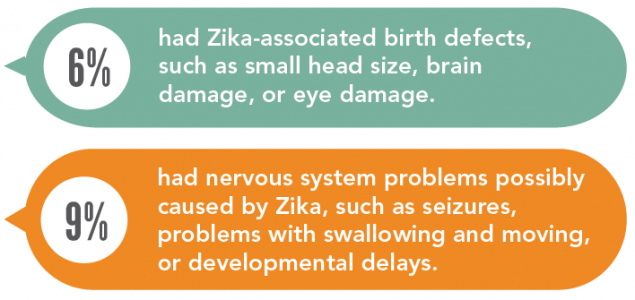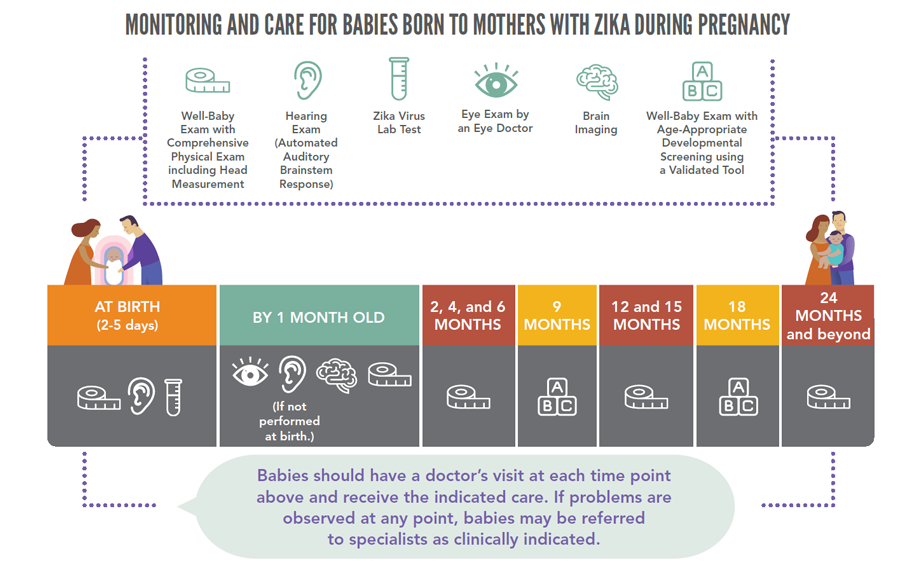Vital Signs: Zika in Babies in US Territories
Monitoring early health and development

Free Continuing Education (CE) on Vital Signs: Zika-Associated Birth Defects and Neurodevelopmental Abnormalities Possibly Associated with Congenital Zika Virus Infection — U.S. Territories and Freely Associated States, 2018 (MMWR/Medscape) – available until October 2, 2019.
4,800. Over 4,800 pregnancies in the US territories had a lab result showing confirmed or possible Zika from 2016-2018.
1 in 7. About 1 in 7 babies had health problems possibly caused by Zika reported, among 1,450 babies at least one year old.
1 in 3. Only 1 in 3 babies had the recommended eye exam reported, among 1,450 babies at least one year old.
Zika virus (“Zika”) infection during pregnancy can cause severe health problems in babies, such as birth defects, problems with vision and hearing, seizures, and developmental delays. More than 4,800 pregnancies in the US territories (American Samoa, Federated States of Micronesia, Puerto Rico, Republic of Marshall Islands, US Virgin Islands) had a lab result showing confirmed or possible Zika from 2016-2018. From these pregnancies, 1,450 babies were at least one year old and had some follow-up care reported for this analysis. About 1 in 7 (or 14%) of the 1,450 babies had one or more health problems possibly caused by Zika reported to the US Zika Pregnancy and Infant Registry. Some of these problems were not apparent at birth and were identified as the babies grew older. The full range of long-term health problems caused by Zika will remain unknown until these babies mature. Identifying health problems early can help babies and children get the care they need. For example, only about 1 in 3 (or 36%) of the 1,450 babies at least one year old had an eye exam by an eye doctor as recommended. These exams can help identify vision problems early, so that babies can get glasses or other services they may need. Throughout early childhood, healthcare providers should closely monitor the health and development of all babies born to mothers with Zika during pregnancy.
Healthcare providers can:
- Ask every mother about possible Zika exposure during pregnancy, even if her baby appears healthy.
- Share Zika test results with all healthcare providers of both mother and baby.
- Provide recommended follow-up care and referrals, including early intervention services. https://bit.ly/2JNQn6B
- Report health information about babies and young children affected by Zika during pregnancy to their state, local, or territorial health department, even if they appear healthy.

Zika causes birth defects and nervous system problems.
Based on reported data, babies affected by Zika have received these recommended exams…
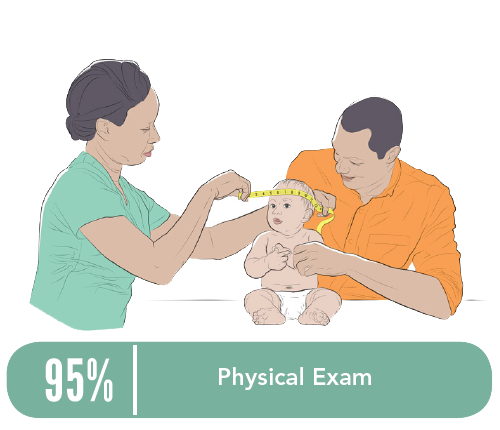
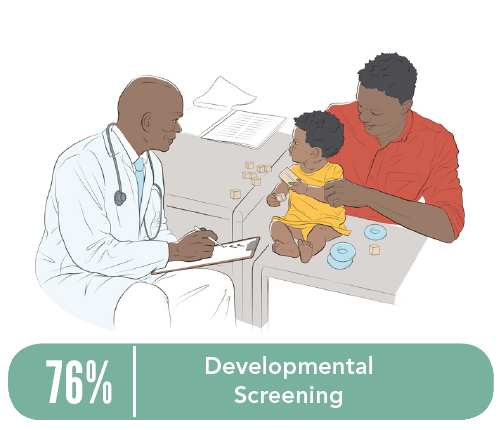
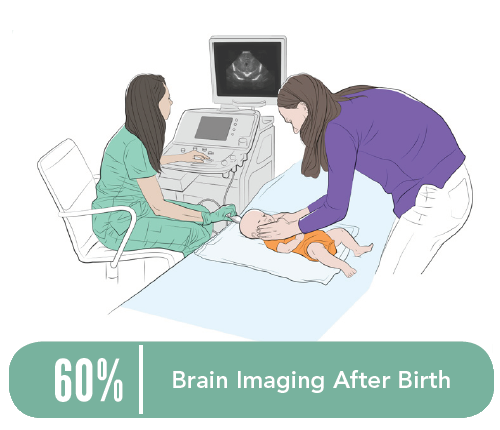
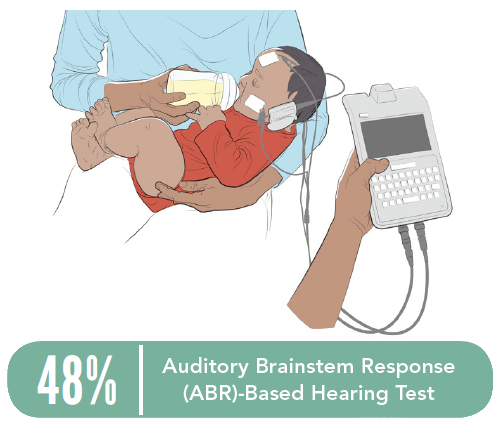
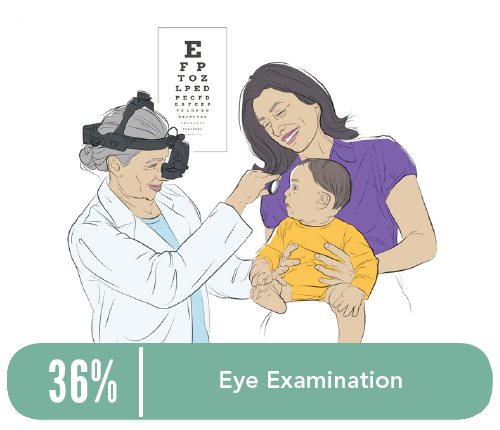
Working together to care for babies and children affected by Zika
Babies born to mothers with Zika during pregnancy should receive special follow-up care, even if they appear healthy. Detecting health problems early and getting help can make a difference. Parents and healthcare providers can work together to make sure that each affected baby gets the care he or she needs.
Parents can tell their healthcare providers about possible Zika exposure during pregnancy, check to make sure their baby is meeting milestones for development, and mention any concerns.
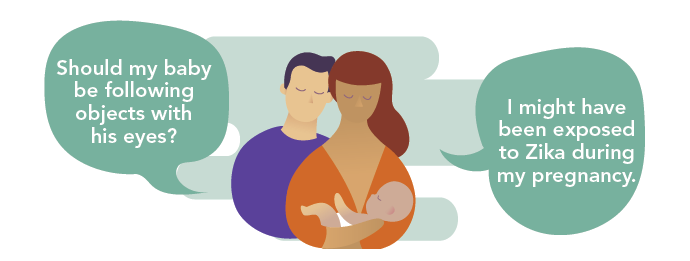
Healthcare providers can ask mothers about possible Zika exposure during pregnancy and ask parents about any concerns with development.
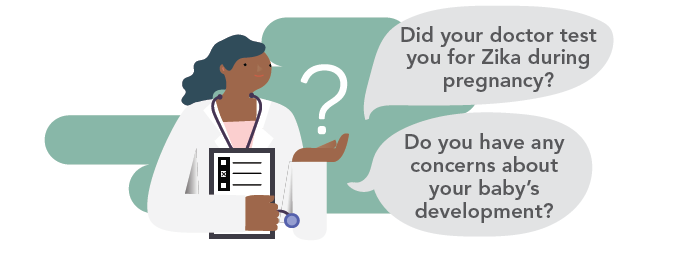
View large image and text description
SOURCES: Bright Futures Recommendations for Preventive Pediatric Health Care; Interim Guidance for the Diagnosis, Evaluation, and Management of Infants with Possible Congenital Zika Virus Infection—United States, October 2017.
The Federal Government is:
- Tracking the health of the largest monitored group of pregnant women with confirmed or possible Zika infection and their babies in the world.
- Analyzing data to better understand how Zika affects babies and their families.
- Working with clinical experts and organizations to update clinical care guidance for pregnant women and babies as new findings emerge.
- Finding the best ways to protect mothers and babies from Zika and other emerging threats, including developing potential vaccines.
Healthcare providers can:
- Ask every mother about possible Zika exposure during pregnancy, even if her baby appears healthy.
- Share Zika test results with all healthcare providers of both mother and baby.
- Provide recommended pediatric follow-up care and referrals, including early intervention services. https://bit.ly/2JNQn6B
- Report health information about babies and young children affected by Zika during pregnancy to their state, local, or territorial health department, even if they appear healthy.
Health Departments can:
- Work with healthcare providers to collect and report medical information about babies in the US Zika Pregnancy and Infant Registry.
- Share CDC clinical guidance for mothers and babies affected by Zika, and CDC’s resources for checking development. https://bit.ly/2sViQ0q
- Keep raising awareness about the risks of Zika during pregnancy and how people can protect themselves.
- Connect families affected by Zika with support groups and services and encourage communication between healthcare providers and families.
Parents of a baby with possible zika infection can:
- Work with healthcare providers to make sure their baby gets the recommended monitoring and care.
- Monitor their baby’s development using CDC’s Milestone Tracker app. https://bit.ly/2yLJLPJ
- Contact early intervention services if there are concerns about their baby’s development. https://bit.ly/2sUj1Js
- Connect with community support groups for families of babies with health problems.
Everyone can:
- Prevent Zika during pregnancy by
- Avoiding travel to areas with risk of Zika during pregnancy.
- Protecting themselves from mosquito bites.
- Preventing the spread of Zika through sex if they or their partners live in or travel to an area with risk of Zika.
- Follow CDC recommendations for waiting to try to conceive after travel to an area with risk of Zika. https://bit.ly/2DAIkaU
Related Pages
- Vital Signs – Zika in babies in US territories [PODCAST – 1:15 minutes]
- Vital Signs – Zika in babies in US territories [PSA – 0:60 seconds]
- Vital Signs Issue Details: Vital Signs: Zika-associated birth defects and neurological abnormalities possibly associated with congenital Zika virus infection – U.S. territories, 2018, Morbidity and Mortality Weekly Report (MMWR)
- Update: Interim Guidance for Preconception Counseling and Prevention of Sexual Transmission of Zika Virus for Men with Possible Zika Virus Exposure — United States, August 2018, Morbidity and Mortality Weekly Report (MMWR)
- El zika en los bebés en los territorios de los Estados Unidos [PDF – 4 MB]
Information for Healthcare Providers
- For Healthcare Providers: Caring for Infants and Children
- Update: Interim Guidance for the Diagnosis, Evaluation, and Management of Infants with Possible Congenital Zika Virus Infection
- Medscape Commentary: Suspect Congenital Zika? What to Do Next
- Developmental Monitoring and Screening for Health Professionals
- Learn the Signs. Act Early. Information for Healthcare Providers
- Bright Futures Guidelines for Healthcare Professionals
- Infant Follow-up Resources for Clinicians
Information for Families
- For Families: Care for Babies with Congenital Zika Syndrome
- Developmental Monitoring and Screening
- Learn the Signs. Act Early.
- Milestone Tracker Mobile App
- Online Resources for Families
General Zika Information
- Preventing Zika
- Zika and Pregnancy
- Zika Travel Information: Areas with Risk of Zika
- General Information about Zika
- US Zika Pregnancy and Infant Registry
Other Sites
- American Academy of Pediatrics
- American College of Obstetricians and Gynecologists
- March of Dimes
- Mother to Baby


